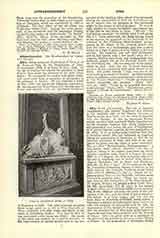

Affre, DENIS AUGUSTE, Archbishop of Paris, b. at St. Rome-de-Tarn, in the Department of Tarn, September 27, 1793; d. in Paris, June 27, 1848. At the age of fourteen he entered the seminary of Saint Sulpice, then under the direction of his uncle, Denis Boyer. He completed his studies with great credit, and spent some time as professor of philosophy in the seminary at Nantes. He was ordained a priest May 16, 1818, and joined the Sulpician community. He was successively Vicar-General of the Dioceses of Lucon and Amiens, and was appointed Coadjutor of Strasburg in 1839. This post, however, he never filled, being called on to act as Vicar-Capitular of Paris, conjointly with MM. Auger and Morel, at the death of Archbishop Quelen. Five months later he was nominated to the vacant see (1840). His tenure of this office was marked by a zealous devotion to the improvement of clerical studies and to the free exercise of the teaching office (liberte d’enseignement). During the insurrection of 1848 the Archbishop was led to believe that his presence at the barricades might be the means of restoring peace. He accordingly applied to General Cavaignac, who warned him of the risk he was about to incur. “My life”, the Archbishop answered, “is of little value, I will gladly risk it”. Soon afterwards, the firing having ceased at his request, he appeared on the barricade at the entrance to the Faubourg Saint-Antoine, accompanied by M. Albert, of the national guard, who wore the dress of a workingman, and bore a green branch as a sign of peace, and by Tellier, a devoted servant. His reception was not very favorable, and he had spoken only a few words when the insurgents, hearing some shots, and thinking they were betrayed, opened fire on the National Guard, and the Archbishop fell. He was removed to his palace, where he died. Next day the National Assembly issued a decree expressing their great sorrow at his death. The public funeral, July 7, was one of the most striking spectacles of its kind. Archbishop Afire wrote, in addition to his pastorals and various articles in “La France Chretienne”, “Traite de l’administration temporelle des paroisses” (Paris, 1827; 11th ed., 1890), “Traite de la propriete des biens ecclesiastiques” (Paris, 1837), “Introduction philosophique a l’etude du Christianisme” (Paris, 5th ed., 1846).
FRANCIS W. GREY

